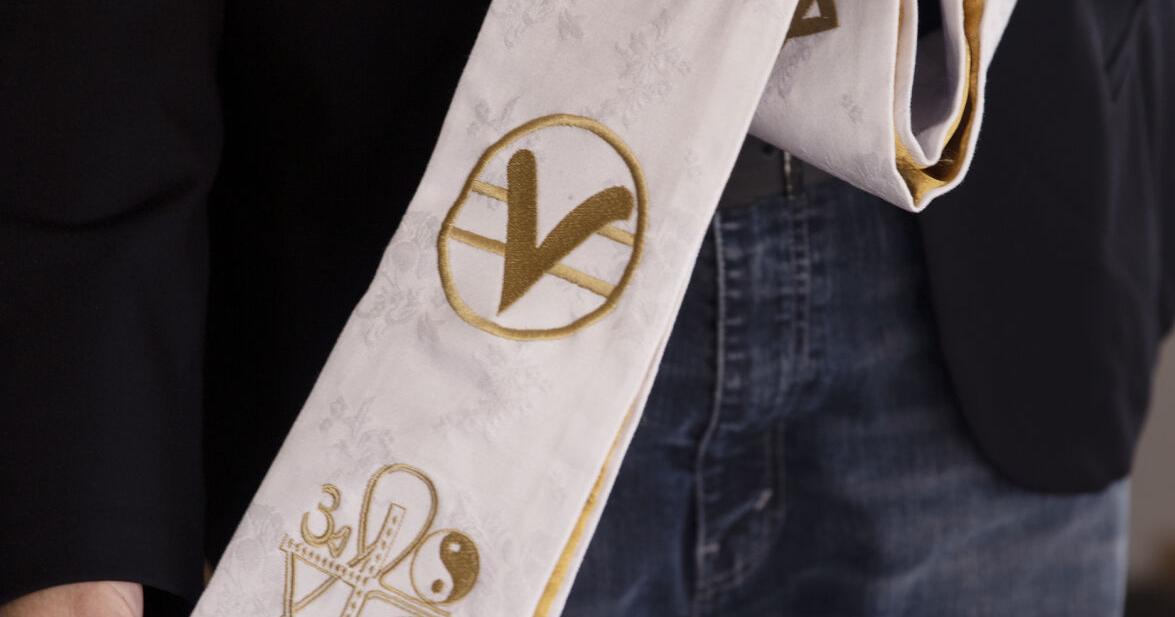
The thing Anna Scott remembers about being on meth is it made her teeth feel soft.
“I don’t know what it is really, something about what that chemical does, but it makes your teeth feel soft. A lot of meth people don’t have teeth, but I remember how my teeth would feel soft, like spongy. Interesting, isn’t it?”
Scott, now in her mid-60s and a reverend for the Center for Spiritual Living in Grand Junction, is grateful she got out of the drug life while she still had her teeth.
It has been a long journey for Scott, who was addicted to drugs and alcohol for about 10 years before finding the church in the early 1990s. She was officially ordained as a minister on March 25.
“It didn’t start out every day, but it ended up every day. It started out partying, like maybe on a Friday night or something. Then the drugs took over,” Scott said.
After that, Scott says, she didn’t really go out and party because she was too busy doing drugs at home.
One night, in the early 1990s, Scott was hanging out at a bar downtown. A Wednesday-night regular named Dave kept asking her to go to his church, and Scott finally relented, attending a Christmas Eve candlelight service.
“When I went to that service, I knew I’d be back,” she said. “I could just see a peace in those people and just a light, the way the atmosphere, the energy .., I knew I’d be back.”
She started attending regularly, but worked hard to not draw any attention to herself.
“I had a mode of operation. What I would do is I would wait for the moment the service would start, and I would come in, sit at the back, and just as they started to sing the closing song, I would run out the door.
“I didn’t feel worthy, and it was uncomfortable for me to hug these people that I didn’t know. And this is a hugging bunch of people,” Scott said.
As she continued to attend and became more comfortable, Scott started working the mimeograph machine for Sunday services.
“It was good for me because I felt like I was contributing. So that was really good. That was important, at that time, for me,” she said.
Then she started singing with the choir.
”The way I did it, I have a good ear for pitch, and the lady that I sang with had beautiful pitch, so I would just lean over into her and get the pitch, then I could do it,” Scott said.
Bonding with the women in the choir was an important step, Scott said.
”Drugs ended up being my main problem, and coming off drugs you don’t really feel that great or think that clearly, so I was working through that,” Scott said. “But it was great to feel of service, it was great to know that I could read and understand things still after trying to fry my brain.”
”So yeah, little by little I got more and more involved.”
“When I was young and fresh into this, I was drinking up all this interesting stuff and there were classes that the only thing I hadn’t taken was practitioner training, and I thought I’m probably not going to be a practitioner, but once I got through that I looked back on my life and … this place saved my life,” Scott said.
“When I first showed up here I was just coming off of a long drug addiction, of meth, you know and drinking, all that. So having not really that great of a quality of life, so I decided because of what this center had done for me, that I wanted to give back. If I could be in a position to help someone in that situation, I wanted to do it.”
Scott became a practitioner, which is a sort of spiritual adviser, and continued that for about 17 years. All the while, people would ask her to become a minister.
“I thought, oh no, people like me don’t become a minister,” Scott said.
During that time, Scott was healing from much of the pain that caused her to drink and take drugs and, as a practitioner, she said she wanted to help others.
“Interestingly enough, once I got into ministerial school, a lot of people who are ministers have had a life, and sometimes a not-that-pleasant one,” Scott said.
It took the breakup of a long-term relationship and a friend asking if there was anything in the back of her mind she always wanted to do that inspired Scott to enter ministerial school.
The Center for Spiritual Living, temporarily located at Koinonia Church on 25 Road, raised funds for Scott to attend school in Denver. She had considering selling her house to pay for it before that.
“Ooh, I’m glad that didn’t happen. Now that house is worth three times what it was then,” Scott said.
The first time Scott drove to Denver for school, she was crying the whole way, and then she cried through the first class.
“I couldn’t believe what I was doing,” she said.
Scott worked full-time as manager of a C&F convenience store and was a practitioner at the church while also going to ministerial school.
The school taught her many practical things, such as how to set up financials, how to work with people, how to counsel people and how to give a talk/sermon, as well as the study of different religions.
“My favorite classes were the ones about quantum physics and how it ties into our philosophy,” Scott said. “I thought if I were younger, I would like to go back to school and become a quantum physicist.”
Scott was an assistant minister for three years, and when the minister left, the Center for Spiritual Living started a search for a new minister, eventually landing on Scott.
Scott’s ordination had to be put off several times by the COVID-19 pandemic.
“It was more than I could have imagined; it was such a loving experience,” Scott said.
The Center for Spiritual Living practices Science of Mind, which Scott said is more a philosophy than a religion.
Science of Mind is part of the religious science movement based on the notion that each human is an expression of God.
“It’s about realizing there really is no separation between God and us, between you and me. There’s one spirit of God; there’s one spirit of life.”
One thing Science of Mind teaches is to take personal responsibility for our lives, Scott said.
“You can imagine that was a delightful notion for me as I was coming in off my drug hiatus,” Scott said.
Another thing the center practices is inclusion.
“Center for Spiritual Living Grand Junction is a diverse, radically inclusive, not-your-usual church. We provide a great place for ‘the rest of us’ who are looking to connect with God/Higher Power/Universal Presence, but don’t really fit in with any one religion. Though we celebrate age-old spiritual traditions from around the world, our message and delivery are modern and down to Earth. So relax, have fun, and look around — chances are you’ll see people just like you,” a message on the center’s website states.
“I’ve had the feeling of being discriminated against,” Scott, who is gay, said. “Especially when I was younger. These days, either I’m around people who don’t care or it’s just not such a big deal anymore, I don’t know.”
”I want all people to be treated equally, I want all people to have a chance. That really drives me.”
Scott works with Together Colorado, a group of faith leaders who work on social justice actions.
”I think that our philosophy has grown to where we see that it’s our responsibility to say “this is not right,’” Scott said.
Scott grew up in Nucla, but left there at age 13 to move to Grand Junction. She attended Central High School and the former Western State College.
Scott moved back to Nucla to teach at age 25, but that didn’t last long, partially because she found it a difficult environment for a gay person.
Scott thinks having difficulty fitting in places because she is gay is partially what led her to drugs and drinking
”One of the hidden beliefs for me and drugs was wanting to fit in, like I wanted to fit in with those people,” Scott said. “It seems so icky now. I had a good time, I liked the people, it’s that codependent icky thing. So the false belief for me was that I wasn’t acceptable, like I didn’t fit in, that I was gay and an addict. But I don’t have to stay that way. I mean I’m probably going to have to stay gay, i think. If it’s a phase it’s lasted 44 years.”
Scott never thought about eventually becoming the person leading the service when she first started attending church in the early 90s.
”Mostly I can remember the energy and the feeling in that room and the way people were with one another,” she said. “At first that was the thing I was searching for, was inner peace. I was not at peace with myself.”
When Scott first came into the church, she said, she was drawn by a feeling that she belonged, a feeling like she had something to offer.
“I needed to fit in somewhere that wasn’t a bar,” Scott said. “That’s really wonderful after feeling like you’ve been a burden on society.”
“We always have a choice, and God is always there to support us. And that we can change for the better,” she said.







